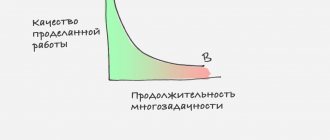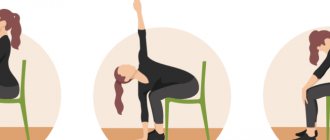Why is ADHD dangerous?
Impaired attention and hyperactivity in children lead to the fact that a school-age child with normal or high intelligence has impaired reading and writing skills, cannot cope with school assignments, makes many mistakes in completed work and is not inclined to listen to the advice of adults. The child is a source of constant anxiety for those around him (parents, teachers, peers), as he interferes in other people’s conversations and activities, and overreacts to external stimuli (the reaction does not correspond to the situation). Such children have difficulty adapting to a team; their clear desire for leadership has no basis in fact. Due to their impatience and impulsiveness, they often come into conflict with peers and teachers, which aggravates existing learning disorders. A child with attention deficit is also unable to foresee the consequences of his behavior and does not recognize authorities, which can lead to antisocial acts. Antisocial behavior is especially common in adolescence, when children with attention deficit hyperactivity disorder have an increased risk of developing persistent behavioral disorders and aggressiveness.
Where to contact parents
If parents detect at least a few signs of hyperactivity, they should seek advice from a specialist. A child neurologist and psychiatrist deals with issues of nervous system development. You can start the examination with a visit to a child psychologist. It will help distinguish ADHD from neurosis and other diseases. If the diagnosis of attention deficit disorder in children is confirmed, treatment is prescribed by a neurologist.
The diagnosis of ADHD is confirmed or refuted based on data provided by parents:
- Child behavior in a group.
- Favorite games and nature of fun.
- Correspondence of mental and speech development to age.
- Patterns of sleep, eating behavior and daytime activity.
- The presence or absence of motor disinhibition.
In addition to this information, the specialist offers the child to undergo a series of psychological tests. An MRI examination, EEG (Electroencephalography) and other types of diagnostics may be prescribed.
Types of ADHD in children
There are 3 types of attention deficit hyperactivity disorder depending on the symptoms:
- Syndrome combining attention deficit hyperactivity disorder
- Attention deficit disorder without hyperactivity
- Hyperactivity disorder without attention deficit disorder
The incidence of attention deficit hyperactivity disorder, according to various authors, varies from 2.2 to 18% in school-age children. Almost every school class has at least one child with this disease.
Boys suffer from ADHD 2 times more often than girls, and boys are more likely to have isolated hyperactivity or hyperactivity in combination with attention disorders.
What is ADHD
Attention deficit refers to the developmental characteristics of a child, which consist in a violation of his behavior. A child with ADHD is characterized by increased activity and inability to focus on one thing. Such a child cannot sit still for a long time, and immediately abandons uninteresting activities.
Attention deficit can also be recognized by the child’s reaction to adult comments. The baby hears and understands everything, but does not follow the instructions of his elders. Requests to stop the “stupid” running around have no effect. the child seems to feel the need for constant movement.
Impulsiveness forces a child to move. He does not plan his actions and does not try to predict their outcome. Before preschool age, the main dangers of such an active lifestyle are household injuries and the risk of getting lost in an unfamiliar environment.
As the child grows up, the problem also “grows up” - it is difficult for the child to learn and fix his attention. This is why it is extremely important to diagnose the syndrome at the earliest possible stage.
Symptoms and diagnosis
A diagnosis of attention deficit disorder can be made if at least 6 of the symptoms described below are present.
A child has attention deficit if he:
- Does not pay attention to details and makes mistakes in work
- Difficulty maintaining attention at work and play
- Doesn't listen to what he is told
- Unable to follow instructions
- Cannot organize play or structured non-play activities (such as doing homework)
- Has difficulty completing tasks that require long-term concentration
- Often loses things
- Often and easily distracted
- Sometimes forgetful
To be diagnosed with hyperactivity, at least 5 of the following symptoms must be present.
A child is hyperactive if he:
- Makes fussy movements with arms and legs
- Often jumps out of his seat
- Hypermobility in situations where hypermobility is unacceptable
- Can't play quiet games
- Always on the move
- talks a lot
- A child is impulsive if he:
- Answers a question without listening to it
- Can't wait his turn
- Interferes with others' conversations and games
- Mandatory characteristics of ADHD also include:
- Duration:
- symptoms have been present for at least 6 months
- Consistency, spread to all areas of life: adaptation disorders are observed in two or more types of environment (for example, at school and at home)
- Severity of impairments: significant impairments in learning, social contacts, professional activities
- Other mental disorders are excluded: symptoms cannot be associated solely with the course of another disease
Subtypes or forms of ADHD syndrome.
It is also important to note that a particular child with ADHD syndrome may have disturbances in any of the three main groups of symptoms in any combination, and depending on the relative severity of a particular group of symptoms, 3 main forms or subtypes of the syndrome are distinguished -
- a) a form with a predominance in the clinical picture of behavioral disorders, mainly symptoms of attention disorders;
- b) a form with a predominance of symptoms of hyperactivity/impulsivity and
- c) a mixed form with the presence of both symptoms in approximately equal proportions.
Particular emphasis in these guidelines is placed on the universal and situation-invariant nature of these disorders. In other words, if we are talking about a child’s hyperactivity, then it should equally manifest itself both at school and in any other situations - at home, in public places, in communication with peers, etc. If “suspicious” behavior is observed in a child in some isolated situation, for example, at school, then one can suspect that such incorrect behavior is due to some other, situational factors.
What causes ADHD?
The formation of ADHD is based on neurobiological factors: genetic mechanisms and perinatal damage to the central nervous system (damage to the brain and spinal cord that occurs during pregnancy, childbirth and the early postpartum period), which can be combined with each other. It is they who determine changes in the functioning of the nervous system and disorders of higher mental functions and behavior that correspond to the picture of the syndrome.
In many cases, additional influence on children with ADHD is exerted by negative socio-psychological factors (primarily intra-family), which in themselves do not cause the development of ADHD, but always contribute to an increase in the child’s symptoms and adaptation difficulties.
Disorders associated with ADHD (so-called comorbid disorders).
Additional difficulties in family, school and social adaptation in children with ADHD may be associated with the formation of concomitant disorders that develop against the background of ADHD as the underlying disease in at least 70% of patients. Comorbid disorders in ADHD are represented by the following groups: oppositional defiant behavior, anxiety disorders, mood disorders, speech development disorders, learning difficulties, lack of coordination, awkwardness, tics). Other related ADHD disorders may include sleep disturbances and involuntary urination during sleep.
Diagnosis and treatment
A healthy child is spontaneous, active, mobile and curious, so you should not consider any manifestation of disobedience or inattention as a sign of attention deficit.
A child psychiatrist or psychotherapist can make a diagnosis and determine the cause of the pathology, who will determine the necessary scope of additional diagnostic measures: neuropsychological and pathopsychological examination, EEG, Neurotest blood test, after which he will prescribe the treatment that is most suitable for your child - psychological or, possibly, medicinal and psychological.
In the complex correction program, the most effective are individual neuropsychological classes, a cerebellar stimulation program, biofeedback therapy, group therapy, and MIM therapy.
Also, the specialist will determine the need for family-parent consultations - for any child, relationships with parents are the most important relationship, largely determining his entire life. It is in these relationships that the child forms an understanding of his own “I”, receives a supply of love and security, from which he will subsequently draw strength when solving “adult”, serious problems.
During consultations, our specialists create a special atmosphere that helps the child reveal himself.
It is possible for a child with ADHD to learn to accept obligations and behave in accordance with social rules and norms, on the one hand, through a system of neuropsychological correctional classes that will help form missing cortical-subcortical connections in the central nervous system, and on the other hand, to fill deficit of situations of social acceptance - in a psychotherapeutic group, in the family. This does not always work out even for those closest to you - the child’s parents; the main manifestations of ADHD create difficulties in any relationship.
A family psychotherapist (psychologist) will help you analyze family relationships and together find additional opportunities for non-conflict interaction, which can be very difficult and sometimes impossible to do while inside the family system.
How is ADHD treated?
The best results in the treatment of attention deficit hyperactivity disorder are achieved by combining various methods, but a neurologist must decide on the complex of necessary treatment measures.
When treating ADHD, our doctors use a unique method of Biophysical neuromodulation, which triggers the internal mechanisms of self-regulation of the central nervous system structures and is able to restore the normal development of the child, positively affecting cognitive functions (attention, memory, speech). In addition, our method has a positive effect on metabolic processes in the nervous system and promotes the maturation of new brain cells. In cases where ADHD is combined with destructive behavior, anxiety disorders, and neuroses, treatment is combined with micropolarization and interactive adaptive neuro-biofeedback training, which enhances synaptic transmission in different brain structures. Often, sleep and behavior disorders accompanying ADHD require additional sessions with a neuropsychologist. Another direction of ADHD therapy is to control negative nutritional and environmental factors that lead to the entry of toxic substances into the child’s body (lead, pesticides, food coloring, preservatives). Among the micronutrients with a proven clinical effect in ADHD, magnesium preparations should be noted. Thus, treatment for attention-deficit/hyperactivity disorder should begin early (immediately after diagnosis), be comprehensive, continuous and long-term.
Current treatments
If the diagnosis is confirmed, the doctor prescribes treatment. Depending on the severity of symptoms, appropriate therapy is selected. In most cases, treatment includes pedagogical education and work with a psychologist. Treatment with medications is extremely rare. Drugs are prescribed only if the proposed therapy has not produced results.
It is important to know that parents should not ignore the need for treatment. Hyperactivity started in childhood can result in more serious problems. According to statistics, 1% of the adult population of the world suffers from ADHD. As you get older, the problem entails behavioral disorders, a tendency to drug addiction and a high level of anxiety.
Classes with a psychologist
Psychotherapy lessons are based on memory training and the development of attentiveness. The psychologist also uses techniques to reduce anxiety. If the baby has speech defects, speech therapy classes are conducted. At the same time, communication skills develop and conflict levels are leveled.
Parents are encouraged to attend such classes with their child. Often, mom and dad “acquire” irritability and depression, unable to cope with the problem on their own. Partnership classes help parents choose the right model of behavior and eliminate their own mistakes in the educational process.
During lessons with a psychologist, parents will understand that prohibitions in the case of ADHD do not work, but only aggravate the situation. Trust is brought into the relationship between mother and child. The specialist will also help you choose the type of physical activity.
Medications
It is curious that a number of medical experts deny the existence of such a syndrome as hyperactivity. Some doctors explain the child’s behavior by temperamental characteristics, so there is no need to treat ADHD in children.
Some experts argue that ADHD occurs as a result of the child's internal protest against mistreatment. Rigid parenting, an unhealthy family environment, or sudden stress can trigger an increase in activity.
However, in some cases, drug treatment is still practiced. It is based on psychostimulant therapy. Nootropic drugs and sedatives are also used. Sedatives and other medications should be prescribed by a specialist. He also selects the dosage.
Since drug therapy is prescribed for a long time, chemical drugs are periodically replaced with natural remedies. Among the traditional methods of treating ADHD, it is worth noting herbal teas, infusions of valerian, lemon balm and mint. Sedative infusions are used during the child’s rest period. Herbal baths are also effective.
Tips for parents
Since drug treatment for ADHD in children is rarely used, doctors advise reconsidering the atmosphere in which this child is raised. Often the root of the problem lies precisely in the discrepancy between the model of behavior chosen by the parents and the child’s temperament. Tips for parents:
- The relationship between parent and child should be based on mutual understanding. Trust will be the key to the inner world of a hyperactive child.
- Organization of a daily routine and adherence to a routine are mandatory.
- In addition to the period of wakefulness, sleep time is also subject to correction. The child should go to bed and wake up at the same time, regardless of whether it is weekdays or weekends.
- The baby's diet consists of natural, healthy food and the most nutritious products.
- Particular attention is paid to prohibitions. Innate curiosity must be satisfied, so you can only forbid a baby something that really threatens its safety. Communication should not be based on orders. Parents should use requests, not commands. This will free the child from the desire to protest.
- Maximum understanding, care and love should be shown. The child should not witness conflicts.
- He should receive small assignments. It is prohibited to perform them instead. Responsibilities will help instill a sense of responsibility in a young family member.
- During treatment you should avoid visiting too crowded places. It is also important to minimize watching TV and playing with gadgets.
- Parents should become an example for their child, so nervousness should be eliminated from their own behavior even before the baby begins treatment.
Doctors are still arguing about attention deficit hyperactivity disorder in children. Treatment of this disease consists of a psychotherapeutic approach and very rarely includes medication.
Side effects of ADHD medications
Stimulants can have side effects, but these tend to occur early in treatment. They usually pass quickly and in a mild form. The most common ones are:
- decreased appetite or weight loss;
- sleep problems (long-acting medications have a greater impact on sleep and appetite);
- headaches, abdominal pain;
- irritability, tics.
Psychostimulants generally do not affect growth, but they may slow or delay growth during the first two years of treatment.
In rare cases, ADHD medications can cause more dangerous side effects. For example, some stimulants increase the risk of heart and blood vessel problems. Existing mental disorders such as depression, anxiety or psychosis may worsen. It is also known that the use of drugs in the form of skin patches causes discoloration of the skin in the areas that are under the patch.
How to avoid side effects? Before your child starts taking any medications, talk to your doctor about your child's medical history and any medical conditions that run in your family to help predict the risk of some side effects. You should also tell the doctor about any other medications or vitamins your child is taking.
In most cases, side effects can be managed if your doctor helps you:
- change the dose of the medicine;
- adjust the time and frequency of reception;.
- prescribe another medicine.
It is important to remember: you cannot change the order of administration and dosage of the drug in any way without consulting your doctor. Such rash changes can lead to dangerous side effects.
It is recommended to start taking medications for ADHD only in cases where other treatments have been ineffective. Read about non-drug treatment methods for ADHD here
What life is like for children diagnosed with ADHD and their parents
Authors : WoMo
When you have a “problem” child, you cannot hide and pretend that everything is fine - everyone around you reminds you of this many times a day. If you don’t hide from the problem and try to act, then be prepared for the fact that you will still be criticized. This is because few people understand the essence of a childhood disorder like ADHD, everyone thinks that there is “something wrong” with you as a mother.
Anastasia Melnichenko, public figure, chairman of the NGO “Studenaya,” talks about her personal experience as a mother.
My confession
I'm just a very, very tired mom. Anxiety nests like a snake in my chest, I have panic attacks at the thought of having to leave the apartment or solve at least one more problem related to the child. I am writing this text to somehow pull myself together, because it is very, very difficult for me to live with this.
It all started after another round of problems with my eldest son, when the parents of his classmates decided to unite and very convincingly ask us to take the child out of school. This is our fourth school, by the way. So, my child has ADHD - attention deficit hyperactive disorder, complicated by oppositional defiant behavior.
Hyperactivity is not just “excessive” activity in a child. This is a psychiatric diagnosis. The abbreviation ADHD is also used to designate it - attention deficit hyperactivity disorder.
Doctors say that children with ADHD have an “invisible disability,” that is, an inability to control their behavior and impulses; they have motivational disorders and a lag in communication skills. But at the same time, such children are often very well developed intellectually and physically. Therefore, such children are easily labeled as “inadequate”, “bad”, “ill-mannered”, “bullers”, “sadists”, “young thieves”.
Parents with a child with ADHD are easily stigmatized as those who are unable to “raise a child” or “do something with them.” They are accused of not taking care of their children, sending them to school, “neglecting” them, not trying hard enough, and generally being bad parents. In comments on social networks they are suggested to be “buried”, “shot”, and the children are to be “starved”, expelled from school, beaten.
What is ADHD
ADHD, according to various sources, affects from 1.5% to 5% of children, and some put the figure at 15%. The behavioral manifestations of ADHD are a biologically determined feature of the central nervous system and, for the most part, have nothing to do with the child’s ill will or upbringing. According to the website neuronews.com.ua, ADHD is a disorder of a genetic nature and is associated, in particular, with genes responsible for regulating the metabolism and activity of two neurotransmitters - dopamine and norepinephrine.
ADHD is a spectrum. It manifests itself in different ways - from a certain “brooding” of the child to unregulated and socially unacceptable behavior. Therefore, children with ADHD, like children with autism spectrum disorders, present very differently. This is not a disease, because there is no cure, it is a feature of the brain. Some outgrow ADHD, some develop compensatory mechanisms, some slip into alcohol and drug use, get involved with bad companies, and have further problems in relationships and at work. Yes, these children are at risk, so you need to work with them very carefully and not let things take their course.
ADHD abroad and here
Developed countries have clear treatment protocols for ADHD and effective behavioral interventions. There are also special online courses for teachers abroad, which provide clear recommendations for working with such children. These recommendations are very simple. The point is, just as someone needs glasses to see or a stick to walk, kids with ADHD need a little help too. Be able to chew in class, leave class, or fidget in your chair. Be able to solve problems in silence (for example, writing independently in the hallway or a separate room). Receive clear, consistent instructions. Receive praise for simple actions, such as writing down homework.
But in Ukraine this disorder is still shrouded in myths. According to the director of the Institute of Mental Health, A. Romanchuk, the World Association of Child and Adolescent Psychiatry and Related Professions named ADHD the No. 1 problem in the field of mental health for children and adolescents back in 2004, in order to attract the attention of specialists to this issue. Because such children are “survived” from classes, and mothers are literally persecuted by the parent and teaching staff, accusing them of lack of competence. The gap between civilizations is impressive.
In Ukraine (and in Russia), treatment prescribed by international protocols for children with ADHD (that is, first-choice medications) is not available. Not available, you know? No way.
Methylphenidate-based drugs are controlled drugs. They are certified in Ukraine. They say that they are even included in the list of drugs that the state must cover for patients at its own expense. Even tenders are held, which... are declared invalid because none of the manufacturers apply for them. To the question “why?” the manufacturer replies that there is no sales market in Ukraine. They say that once the drugs were brought in and then burned. Moms and dads scratch their feet in search of medicines that are nowhere to be found, and they were simply burned. Before.
It turns out interesting. That is, the state is ready to purchase the drug at its own expense, but there is no market. That is, in Ukraine the statistics of children with ADHD are the same as in the world, but there is no market. Mystic! But doctors happily prescribe Russian-made “bullshit” drugs, the effectiveness of which has not been proven in any way.
What do mothers of such children do? It is impossible to buy medicines in Ukraine, it is impossible to buy medicines according to the official Ukrainian prescription in Europe (I checked Poland, Germany, Italy, Turkey and Israel - this is really a strictly controlled medicine, no one sells it according to the Ukrainian prescription), it is almost impossible to buy from illegal resellers. Therefore, the only option is to go to Europe or Israel, register with the child there and take the child abroad once every 3 months to get a prescription for 3 cans of concerta or Ritalin.
It has been scientifically proven that taking psychostimulants leads to a decrease in the manifestations of ADHD in 70–90% of children with this diagnosis. That is, the vast majority of families who face this disorder would receive an improvement in their quality of life only thanks to the availability of medications.
Myths about ADHD
- This is simple bad manners. No, in general, manifestations of hyperactivity and lack of impulse control are not associated with poor parenting or malicious intent of the child. These are biologically determined features of the functioning of the central nervous system. Therefore, you should not scold or blame the child: he simply cannot control it. This is the same as scolding a person with poor eyesight because he cannot see something.
- Such a diagnosis does not exist, it is a conspiracy of pharmaceutical companies. In the International Classification of Diseases (ICD-10), ADHD is coded F90. It is an officially recognized, thoroughly studied disorder. The first detailed description of the disorder dates back to 1902. Indeed, in the West there have been discussions about over-diagnosis of ADHD, but this certainly does not threaten us. We rather have the opposite problem - children with ADHD are underdiagnosed. Be that as it may, the symptoms of ADHD are obvious and are diagnosed using tests and EEG.
- Methylphenidate is a children's drug. This wave of fails about the “children’s drug” is rolling from Russia and settling in Ukraine. Indeed, the drugs that are prescribed to children with ADHD act as stimulants on healthy people, while on children with hyperactivity they act... I don’t know how to describe it. Soothing? Stabilizing? These medications affect the metabolism of the neurotransmitters norepinephrine and dopamine, which are responsible for impulse control in the frontal lobes.
Studies have shown that the use of psychostimulants as a first-line medication for ADHD is 80% effective compared to a placebo group. Such children, under the influence of drugs, gain the ability to control their impulses and maintain focus.
I don’t know who has tried methylphenidate, or who was “pinned” by it to say this, but children with ADHD do not feel any narcotic effect.
- Such children need to be isolated! The first reaction of society to such children is to throw them away. And this is quite understandable, because they often fight and disturb the peace. But it pains me that instead of seeking understanding, thanks to which all children will be safe and with the right to education realized, the issues of hyperactive children are mainly solved according to one scenario: get rid of them. But the essence of inclusion is that we create learning conditions for everyone, removing barriers and obstacles, helping those who need this help/
Psychiatrists say that individual education is contraindicated for such children. It should be an inclusive class, accompanied by adults, whatever - but not isolation. This is the same as if a person who needs to walk his legs for physical rehabilitation is forbidden to walk. In the same way, a child whose socialization and communication skills suffer needs to socialize and communicate.
- These kids are real monsters. Children with ADHD are often demonized. One mother of such a child wrote to me and told me about the legends that circulate around her son at school. They say that he gouged out my grandmother’s eyes and stabbed my grandfather with a knife. And that if he reacts to stimuli this way now, then in high school, when he likes a girl, he will rape her. “Should our children wear armor?” - the parents ask in the chat, and their tone is painfully familiar to me.
There were legends about my child too. One of the mothers wished me that the child would do to me the same thing that he did to the teacher. A parent meeting was urgently convened, where one question was to be considered: how my child pulled the teacher’s hair and what to do with him after that. The teacher's survey showed that the children simply started a rumor - no one actually pulled anyone by the hair.
How is it for mom?
What is it like to be the mother of a child who cannot control his impulses and cannot sit still? A child who is unable to motivate himself, exhibits exaggerated reactions to stimuli and has difficulty building social connections? What to do with an always offended, always irritated child?
This is constant fatigue. Fatigue when you can’t be alone or in silence for at least 10 minutes, because someone turns the house upside down, hits your brother, gets offended, screams, slams the door. Don't say that all children are like this. This is not even close to the case. Of course, this happens to all children. This happens to my child ALL the time.
Being the mother of such a child is a constant, chronic shame. Shame for everything: for the fact that your child is not able to get along in a team, is not capable of socialization, fights, takes aim at teachers. He is expelled from all circles and camps. And everyone, literally everyone, thinks that this is your educational failure. Even the closest people are not out of malice, but they wonder: maybe these are problems of upbringing?
This is stress from every call from school, from the circle. This is opposition to the entire class and a willingness to rush at everyone like a panther. Why? Because I no longer have the strength to endure endless accusations. This means coming to each team every time with a thousand needles already protruded in advance, knowing that “it’s about to start.” For example, accusations will begin that I am not doing enough. Honestly, I don’t even know when enough would be enough. Is it not enough that the child is cared for by a neurologist, psychologist, psychotherapist, or psychiatrist? Who else should I add to this list? Where else can you take your child regularly to make it enough? What should I do with a child whose characteristics cannot be treated by education, and drug correction is not available in Ukraine?
What about the children?
ADHD primarily affects children's self-esteem. These are children who, from birth, hear mainly comments addressed to them. Imagine what it’s like: hearing only criticism and comments every day. It's no wonder that children with ADHD feel like outcasts in groups. But there are certain groups where this need can be realized. For example, in the so-called “bad companies”, where the aggressiveness of such children is considered a plus.
What to do?
Praise such children for every good deed, for something that ordinary children don’t even pay attention to: “You wrote down all your homework today - what a great job you are!”, “You put your things in the closet - this is very responsible”, “Today you managed not to break down, although the criticism was unfair. What are you like, wow!”
Find opportunities to socialize in a positive way. Even if an adult has to attend lessons or clubs. Show ways to interact with other children using non-violent methods. Be on your child's side.
***
One of the episodes of the sitcom Mommy was dedicated to ADHD. The series itself talks about alcohol and drug addicts, whose lives before they quit their addiction were extremely antisocial. One of the characters in the series is suddenly diagnosed with ADHD. And she gives this speech at an Alcoholics Anonymous meeting: “I saw a doctor, and he diagnosed me with attention deficit disorder. And this explains my whole life! Problems in school, at work, in relationships. There is good news: I can ask for more time for the EIT. I can even rent it out in a separate room so as not to be distracted. To try one more time. I wish I could redo everything in my life that I did wrong! God, how did no one notice? If only one of the adoptive parents or teachers had said: she is not stupid! She just needs help! - then everything could have gone differently. It’s been difficult for me all my life, and now I find out that everything could have been different! There's so much I could have done differently."
And with this I would like to end. My dream is for all of us - both parents of hyperactive children and parents of children without hyperactivity - to understand that children with ADHD desperately need help. So they could do a lot of things differently. And live a good, fulfilling life.
This material can be read in Ukrainian here.
published 05/15/2019 13:09 updated 07/19/2019 — Pedagogy and psychology, Treatment methods, Congenital and hereditary diseases, Nervous, mental and psychological diseases, Health care organization, Special children and their families










